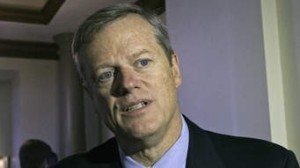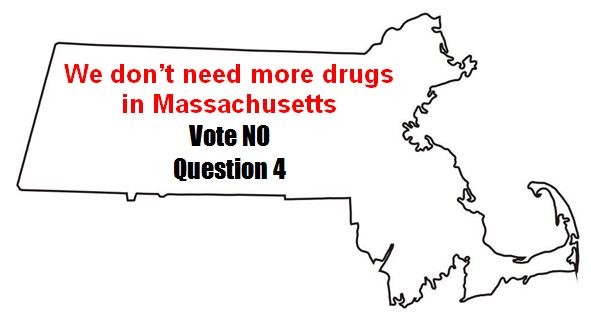Massachusetts Can Lead Nation in Healthy Drug Policy
A foundation dedicated to the health and well-being of people in central Massachusetts donated $100,000 to defeat commercial marijuana in Massachusetts this year. The Campaign for a Safe and Healthy Massachusetts is the official opposition effort against Question 4, which would legalize recreational pot.
The Health Foundation of Central Massachusetts, Worcester, formally voted to oppose Question 4 and to make a large contribution in opposition to the ballot. Marijuana proponents outspend anti-legalization campaigns by millions of dollars, so donations to the Campaign for a Safe and Healthy Massachusetts would be greatly appreciated. (Donate here)
The Health Foundation is concerned that allowing the billion-dollar commercial marijuana industry to promote and sell its products would negatively impact public health. Pot edibles which include highly potent products like candy, chocolates, cookies, and sodas would be allowed. These products are particularly attractive to kids and look like popular sweets. They account for 50% of the sales in Colorado.
Question 4 sets no limits on the number of pot shops statewide. In Colorado, that has resulted in more pot shops than McDonalds and Starbucks combined.
“The leadership of the Health Foundation of Central MA is exemplary of what all organizations, groups, associations and residents need to do in order to keep the Commonwealth from being snowed by the marijuana industry who wrote the law that completely protects their big profit interests,” said Heidi Heilman of Massachusetts Prevention Alliance. “The law was written by the industry for the industry. If it passes it’ll be the tax-payers who’ll be burdened with the shovel-up costs from all the negative outcomes,” she concluded.
Most Massachusetts Politicians Join Forces to Oppose Question 4

The Commonwealth could lead the country into smart drug policy. A strong bipartisan team of leaders is working to shut the door on promoting drug dependency and addiction for profit.
The Foundation joins a bi-partisan coalition of elected leaders as well as health care, public safety, business, anti-addiction, and child protection advocates who are opposing Question 4. Governor Charlie Baker, Lieutenant Governor Karyn Polito, Boston Mayor Marty Walsh, Speaker Robert DeLeo, Attorney General Maura Healey, Sheriff Steve Tompkins, 120 legislators and many other elected leaders have come out in opposition to Question 4.
In fact, Governor Baker, Attorney General Healey, Mayor Walsh and Speaker DeLeo have been exemplary leaders in their ability to study all aspects of the issue, educate the voters and work across the aisle. A group of legislators went to Colorado to study legalization and see if it legal pot could be implemented safely.
An interviewer recently asked Senator Elizabeth Warren of Massachusetts if she supports marijuana legalization. Senator Warren did not give a “yes” or “no” answer. She replied that marijuana is decriminalized in Massachusetts, putting the state in a difficult position. She did not endorse Question 4, and probably knows that enacting it would be bad for the Commonwealth. It’s clear from the video that Senator Warren does not think there’s enough regulation now. She’s smarter than the legalizers who would love to trap her into supporting Question 4. (Decriminalization of pot in 2008 resulted in a great increase of marijuana use, followed by a opiate and heroin crisis.)
A citizens group of 20 claimed that Question 4 doesn’t have a definitive standard for testing drivers and that it lacks transparency while leaving policy specifics unsettled until after the vote.
One of the state’s Congressional representatives, Rep. Stephen Lynch, just announced that he is against Question 4. Lynch said that he has worked with recovering addicts, noting that “I haven’t met an addict who didn’t start with marijuana.”
Investigative Journalism Misses the Mark — for the Most Part
Lee Fang’s “investigative” article published in The Nation two years ago suggested that only those who lose profits are against legalizing marijuana. His predictions have turned out to be largely incorrect. The pharmaceutical industry–like the marijuana industry — spends money on lobbying and donating to politicians, but is not politically involved in the marijuana issue. According to the Brookings Institution, “pharmaceutical companies have kept an arm’s-length distance from marijuana ballot initiatives.”
Fang’s investigation provides excellent insight into the marijuana industry — which suspects that everyone must have a profit motive. Much of the giving to marijuana ballots comes directly from the pot industry. Three of the largest donations to marijuana legalization in Massachusetts come from marijuana businesses, including one in Colorado looking to expand.
In Massachusetts, some of the groups that oppose Question 4 include:
· Massachusetts Hospital Association
· Massachusetts Medical Society
· Massachusetts Municipal Association -Massachusetts School Nurses Association
· Conference of Boston Teaching Hospitals
· Associated Industries of Massachusetts
· Retailers Association of Massachusetts
· Association of School Superintendents
· Construction Industries of Massachusetts
· Action for Boston Community Development
· Association for Behavioral Healthcare
· National Association of Mental Illness (NAMI) – Massachusetts
· Massachusetts Chiefs of Police
· Massachusetts Sheriffs Association
· all Massachusetts District Attorneys
The NAMI chapter in Maine will also be coming out against legalization in that state, a clear indication that marijuana is toxic for those diagnosed with mental illnesses.
Only in the instance of law enforcement have investigative journalists been correct in predicting opposition to legalization. Police unions oppose legalization, but The Nation article doesn’t probe the deeper reason for their opposition.
Looking for Evidence-Based Solutions
In explaining the Health Foundation of Central Massachusetts, President Jan Yost, Ed.D., said: “The Foundation maintains that Massachusetts would be wise to wait for further evidence from research and other states’ experiences regarding the impact of the use of marijuana on health status, employee performance and public safety, before voting to allow recreational use. This position is consistent with the Foundation’s practice of advocating for public policy that is based on evidence.”
“In addition, the Foundation is concerned that sanctioning marijuana as a legal substance will likely normalize its use and create a commercial industry intent on spreading the use, like the tobacco industry.” The Nation‘s 2014 article could have looked into why health organizations, hospitals, educators and doctors’ groups oppose marijuana legalization instead of promoting a preordained agenda set by financiers.
Health organizations have insights that a biased media does not have. Evidence-based solutions don’t support pot legalization.
Massachusetts is leading the country in wise drug polices. New England may be ahead of the rest of the country. Vermont and Maine rejected legalization through their state legislators. These states realize that marijuana is not a solution to the opioid abuse that is rampant today. Replacing one addiction with another addiction is a bad idea, and actually encourages multi-addiction, making recovery more difficult. Please donate and vote against the addiction-for-profit industry in Massachusetts or in your state.


